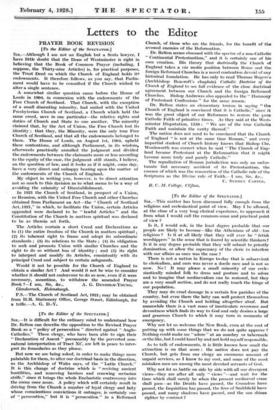[To the Editor of the SPECTATOR.] SIR,—It is difficult for
the ordinary mind to understand how Dr. Relton can describe the opposition to the Revised Prayer Book as a " policy of persecution directed against " Anglo- Catholics." These clergy, who have been able to sign their " Declaration of Assent " presumably by the perverted non- natural interpretation of Tract XC, are left in peace to inter- pret its formularies as they please.
But now we are being asked, in order to make things more palatable for them, to alter our doctrinal basis in the direction, as the Archbishop of Wales says, of the " Latin Church." It is this change of doctrine which is " reviving ancient hostilities, and removing barriers and renewing sectarian strife," since it brings the whole Eucharistic controversy into the arena once more. A policy which will certainly result in driving from the Church a number of loyal clergy and laity whose conscientious convictions it outrages, is certainly one of " persecution," but it is " persecution " in a Reformed Church, of those who are the friends, for the benefit of the avowed enemies of the Reformation.
Dr. Relton seems obsessed with the spectre of a non-Catholic " Continental _Protestantism," and it is certainly one of his own creation. His theory that doctrinally the Church of England takes a via media position between Rome and the foreign Reformed Churches is a novel contention devoid of any historical foundation. He has only to read Thomas Rogers's (Archbishop Bancroft's chaplain) Catholic Doctrine of the Church of England to see full evidence of the close doctrinal agreement between our Church and the foreign Reformed Churches. Bishop Andrewes also appealed to the " Harmony of Protestant Confessions " for the same reason.
Dr. Relton states an elementary truism in saying " the Church of England is convinced that it is Catholic," since it was the great object of our Reformers to restore the pure Catholic Faith of primitive times. As they said at the West- minster Disputation, 1559: " We are of the true Catholic) Faith and maintain the verity thereof."
The nation does not need to be convinced that the Church of England " is not at the same time Roman," and every impartial student of Church history knows that Bishop Chr. Wordsworth was correct when he said " The Church of Eng- land became Protestant at the Reformation that it might become more truly and purely Catholic."
The repudiation of Roman jurisdiction was only an unfor- tunate but necessary accident of its Protestantism, the essence of which was the reassertion of the Catholic rule of the Scriptures as the Divine rule of Faith.—I am, Sir, &c.,






































 Previous page
Previous page